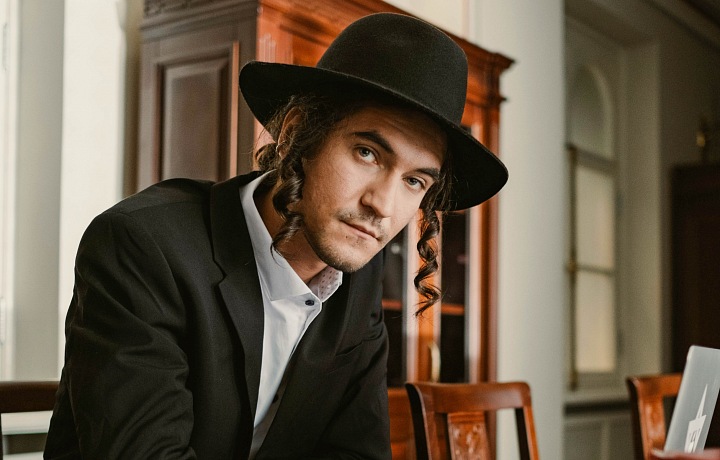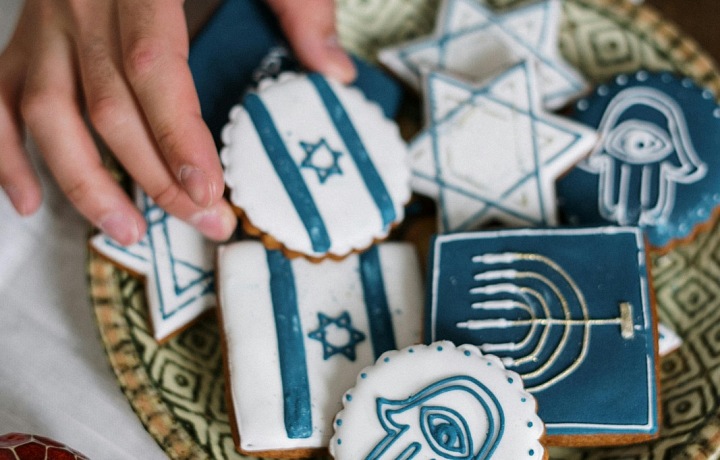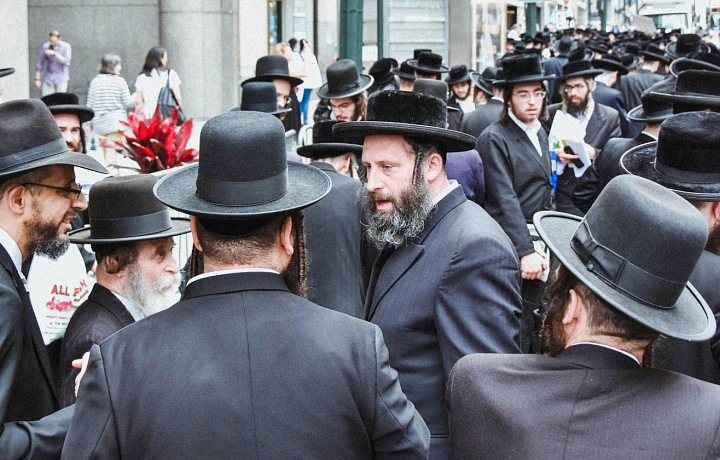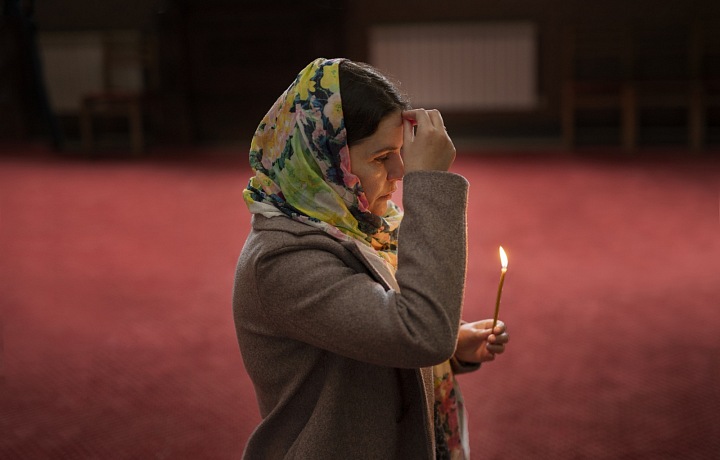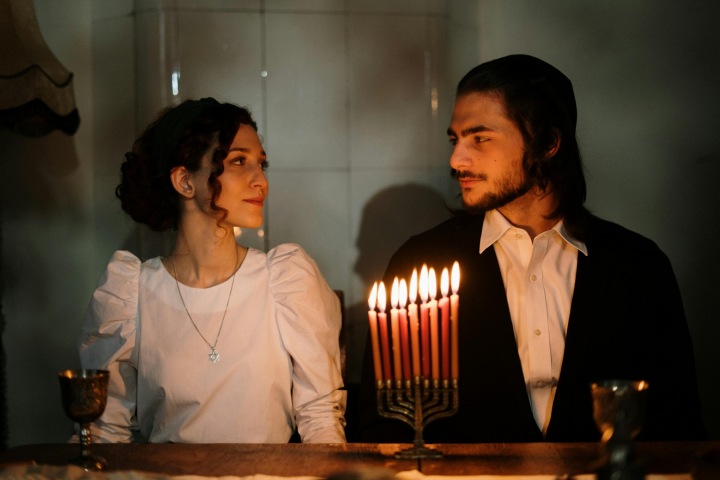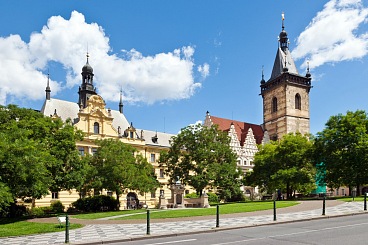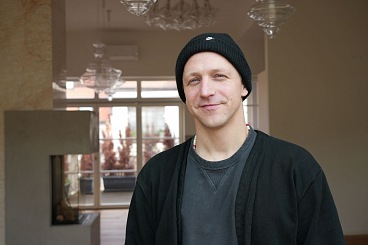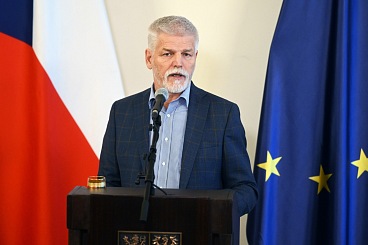I am taking a rabbi: During menstruation and a week after it, the married couple is physically separated
In Orthodox Judaism, a rabbi is expected to be married, as an unmarried man would have a problem gaining a serious rabbinical position. Marriage is considered a sign of maturity. In Judaism, there is no celibacy as an obligation for spiritual leaders, as is the case for example in the Roman Catholic Church. On the contrary, marriage in Judaism is considered very important and natural - it is a commandment from the Torah: "Be fruitful and multiply" (Genesis 1:28).
Some loves come quietly. They don't announce themselves with loud laughter or boisterous flirting. They arrive like a peaceful evening rain, softly sprinkling the dry earth, bringing relief that one didn't even realize they needed. Somehow, Daniel - a man who at first glance looked like a philosophy teacher - entered Klara's life. Quiet, perceptive, with a strong inner world he did not show to everyone. They met at an international conference in Berlin, where Klara was lecturing on cultural identity in a globalized world and Daniel was speaking on the topic of ethical responsibility of religious leaders. Their first conversation was gentle, but deep - it wasn't empty words, but the exchange of views that met somewhere in the space between academic curiosity and quiet human closeness. When she returned home, she had a business card with his email in her hand and a strange tranquility in her soul.
Several months of writing followed. Klára lived in Prague, Daniel worked in a Jewish community in Vienna. Both were busy with work, but the evenings were dedicated to long messages, which gradually turned into voice messages and then turned into video calls. Gradually, they talked about everything - politics, childhood, Jewish holidays, but also about her doubts, whether she would be able to cope with life alongside a spiritual leader. Daniel never pushed her. Instead, he was patient, explained, told stories from his community, and showed that faith does not have to be about commands, but about understanding and profound respect. And so, when he invited her to Vienna half a year later and asked for her hand as she was walking along the banks of the Danube, she said yes - even though she knew she was saying yes not only to him but also to a life that would have a different rhythm than she was used to.
Woman must convert
Marriage to a rabbi is not religiously or culturally forbidden to a woman from another country or culture, including Czech women.
The conversion process to Judaism is complex, demanding, and at the same time, a very personal step which requires time, sacrifice, and deep interest in the Jewish faith, culture and lifestyle. Conversion differs according to individual Jewish branches (Orthodox, Conservative, Reform), with Orthodox conversion being the strictest and most demanding. Here is a basic overview of how the conversion process works, especially in the Orthodox community, which is most often associated with rabbis:
Interest and Decision
Conversion begins with a person's sincere interest and his decision to enter Judaism. This step must be motivated by an inner conviction, not just pragmatic reasons (for example, marriage to a rabbi).
Study and Education
The convert must undergo long-term study of Jewish religious texts, laws (halacha), traditions, history, holidays and everyday life according to Judaism. The study can last several months to years, depending on the intensity and type of conversion. Many rabbis organize personal or group courses.
Practical involvement in the community life
During his studies, it is important for the convert to live by Jewish rules – for instance, observing Shabbat, eating kosher food, attending prayers and holidays in the synagogue. This lifestyle helps him to better understand Judaism and at the same time, it attests to his serious approach.
Interview and assessment by the rabbinical court (Beit Din)
After completing his studies, the convert presents his knowledge and interest before the rabbinical court, which is composed of several rabbis (Beit Din). This court assesses the applicant's readiness to enter Judaism and his genuine understanding and determination.
Circumcision (for men) and ritual bathing (mikvah)
A male candidate for conversion must undergo circumcision (brit mila), if he is not already circumcised. If he is already circumcised, only a symbolic act is performed. After fulfilling all requirements of the convert (both men and women), they undergo a ritual cleansing bath in the mikvah, which symbolizes spiritual rebirth.
Official Acceptance into Judaism
After the mikvah, the convert becomes a full member of the Jewish community. From that moment on, he is considered a Jew according to religious law and has the same rights and obligations as other believers.
This process is difficult and requires sincerity and patience. Conversions outside Orthodox communities may be faster and more flexible, but not all are mutually recognized. In some communities, conversion is also a social obligation and requires family and community support. Therefore, if a Czech woman wants to convert to Judaism, it is good for her to start by turning to the local synagogue and rabbi, who will guide her through the specific process according to the given tradition. Conversion is not just a formal act, but a profound life decision that accompanies the rest of life.
Spiritual connection before the big day
Preparing for a wedding with a rabbi does not just mean choosing a dress and a wedding hall. In Jewish tradition, it is about a spiritual mood, connecting families and communities, which becomes part of the story. Klara came from a Christian family, but was never strictly a believer. Yet she was accepted with respect - on the condition that she understands and respects Jewish values. Several months before the wedding, she started meeting with Rabbi Tamara, who helped her understand the deeper meaning of Jewish customs, the symbolism of marriage, and the status of women in Judaism. Klara was surprised that Jewish tradition has clear rules, but also gives women a large space for spiritual growth and independence.
Part of the wedding preparations was also a traditional ritual called badeken - veiling of the bride. This act, in which the groom lays a veil on the bride's face before the wedding, has a deep symbolic meaning. It is not only a reference to the biblical story of Leah and Rachel, but primarily a gesture by which the groom says: "I see your soul, not just your face." Klara cried during this – not from sadness, but from emotion. For the first time, she felt that love could also be sacred, not just romantic.
Wedding day under the canopy and sky
Their wedding took place on a Sunday afternoon in the courtyard of a historical synagogue in Vienna. Sun rays were reflecting off the windows and in the courtyard stood a simple but beautiful canopy - chupa. Four pillars were supporting a white fabric, symbolizing the new home of the couple. Friends and family gathered in a semi-circle, while Klára walked towards Daniel singing traditional songs. He was waiting for her in a black suit, with a kippah on his head, and a look that revealed more than a thousand words. When they met under the chupa, the older rabbi – Daniel's teacher led the ceremony, comparing their union to the bond between heaven and earth.
During the ceremony, they recited the Sheva Brachot - seven blessings that celebrate love, friendship, joy, and the presence of God. Klára exchanged a ring with Daniel - a simple gold ring, without any decorations, as it should be according to halacha. And when Daniel broke the chalice - the last act of the ceremony, which reminds us that even in happiness we must remember the sadness (especially over the destroyed temple in Jerusalem) - the crowd shouted the traditional "Mazal tov!".
Seven days of celebrations, but also new challenges
The following seven days, known as Sheva Brachot, were spent in the spirit of small celebrations. Every evening someone invited them to dinner, where the blessings were said again and their wedding was celebrated. Klara realized that the Jewish community is not just a spiritual community, but also a large family. And like any family, this one had its rules, customs, but also kindness and support.
New role, new duties
After the wedding, a woman is considered a ba'alat ha-bayit - literally "mistress of the house". This role is viewed with great respect in Judaism. The woman is considered the spiritual manager of the household - she ensures that the house is run in accordance with kashrut (kosher rules), that the holidays are observed and especially, that a peaceful atmosphere is maintained at home (shalom bayit - peace in the household). In traditional communities, she is also in charge of preparing for Shabbat and holidays - lighting the Shabbat candles is one of her privileges.
In addition to the practical aspects, a woman is spiritually expected to be a support for her man. In the case of a rabbi, this also means that she will accept her constant availability to the community and sometimes even her public function, as rabbis often appear in public.
Niddah and Mikvah: Intimacy Subject to the Cycle
One of the most intimate and at the same time strictest traditions of Orthodox Judaism is the law of taharat ha-mishpacha - ritual purity in marriage.
This law relates to the period of a woman's cycle. During menstruation and for seven days afterward (until the woman visits the mikvah - ritual bath), the married couple are physically separated. This means a complete ban on touching, hugging, kissing, and even sharing a bed. After the purification bath, they can approach each other again. Many couples see this break as a way to maintain passion and respect in a long-term relationship.
In reform branches of Judaism, these laws are observed symbolically or not at all, but in traditional rabbinical settings, they are the standard.
Children - a blessing and an obligation
In Jewish culture, having children is not only a joy, but also a mitzvah - a commandment. Spouses are encouraged to bring descendants into the world who will continue traditions. A child born to a Jewish woman is automatically considered Jewish, regardless of who the father is.
If a woman was not Jewish before marriage and converted, her children are also considered full members of the Jewish nation - if she went through recognized conversion.
The children of the Rabbi are often under the scrutiny of the community. Not only because of what they do, but also because of how they behave, how they dress, who they befriend.
The upbringing of children in a Jewish family, especially in a rabbi's family, is of great importance and is firmly connected with religious values, traditions and teaching of Judaism. The rabbi, as a spiritual leader, emphasizes that children grow up with a strong sense of identity, faith and responsibility towards their community and family.
From an early age, children are taught the basics of Jewish religion - prayers, observance of Sabbath and holidays, learning about the Torah and Jewish laws. The upbringing is often strict, but at the same time loving, with an emphasis on respect for parents, teachers, and older community members. The Rabbi and his wife strive to teach their children not only as parents, but also as models in everyday life, to the values of justice and mercy. The education of children is often associated with regular attendance at religious school (yeshiva or cheder) where they learn Hebrew, Jewish history, religious texts and ethics. Thus, children are preparing for the possibility that they will be able to continue this tradition and possibly follow the mission of their parents, if they are interested.
In the question of children in broader Judaism, marriage and family are highly valued. Children are considered a gift from God and continuers of religious and cultural traditions. However, Judaism also respects the difficulties that may arise, and it allows for discussions about divorce or other family situations, emphasizing the resolution of problems in the spirit of respect and responsibility. Rabbis usually strive to lead their families according to these values and support children in their spiritual and personal development. Upbringing in such a family is therefore the combination of traditional belief, a firm moral framework and loving care for future generations.
Divorce is not taboo, but it has strict rules
Although Judaism tries to save marriage, divorce is not forbidden. If the marriage fails, the rabbinical court (Beit Din) can issue a get - a Jewish divorce decree. Without a get, the woman is not religiously divorced and cannot remarry under Jewish law.
If a man refuses to give the woman a chance, he becomes an aguna - a "tied woman" who cannot continue her life. This issue is a big topic in some communities because some men abuse their position. In modern agreements (ketuba), it is often agreed in advance that the man will provide a get in case of separation, thereby reducing the risk.
For the rabbi himself, divorce can be a serious problem, especially in orthodox circles. The spiritual leader is expected to have a stable family life, and if he divorces, it can affect his position in the community.
Women's Identity: Balance between Tradition and Individuality
Many rabbi's wives cover their hair - either with a scarf (tichel), hat or a wig (shajtl). This custom symbolizes purity and devotion to the husband.
At the same time, a rabbi's wife can be very active - she teaches, leads women's studies, helps with holidays, organizes community events. In many communities, the "rebbetzin" (rabbi's wife) is a respected figure who has a great spiritual influence, even though she does not officially hold a rabbinical position.
As spiritual leaders of Jewish communities, rabbis celebrate all major Jewish holidays with their families, which have deep religious, cultural, and social significance. These holidays are for them not only an opportunity for prayer and study, but also for family gatherings and strengthening traditions. These are the most important Jewish holidays that rabbis regularly celebrate with their families:
Pesach (Passover)
Pesach is a holiday celebrating the liberation of the Israelites from Egyptian slavery. It lasts eight days (seven days in Israel) and begins on the night of the 14th to the 15th day of the month of Nisan according to the Jewish calendar (April). The family gathers for a festive dinner called Seder, during which stories from the book of Exodus are read, traditional songs are sung, and symbolic foods are consumed, such as unleavened bread (matzah) and bitter herbs. Pesach is a time of purification and determination to get rid of the "leaven" - that is, sin and impurity.
Sabbath
Although it's not a holiday in the traditional sense, the Sabbath is celebrated every week as a day of rest from Friday evening to Saturday evening. For the rabbi and his family, it is a very important time when they can rest, pray and spend family time together. The Sabbath brings peace and strengthens family ties.
Rosh Hashanah (Jewish New Year)
Rosh Hashanah falls on the first two days of Tishri (usually September or October). It is a time of spiritual cleansing, prayer and the beginning of ten days of repentance (Aseret Yamai Teshuva), which ends with the Yom Kippur holiday. During this holiday in the families of rabbis, prayers are held in the synagogue, often long and difficult, and special dishes are prepared at home, such as apples with honey, symbolizing a sweet new year.
Yom Kippur (Day of Atonement)
Yom Kippur is the most sacred and strict day in the Jewish calendar. It lasts for 25 hours and is devoted to fasting, prayer, and repentance. The rabbis lead prayers in the synagogue, which are among the most intense and emotional of the year. During this day, families do not consume food or drink and spend the entire time in spiritual contemplation and requests for forgiveness.
Sukkot (Feast of Tabernacles)
Sukkot is celebrated five days after Yom Kippur and lasts seven days. This holiday commemorates the journey of the Israelites through the desert, when they lived in temporary sanctuaries (sukkah). During Sukkot, rabbinic families build such shelters, where they eat, pray and sometimes even sleep. It is a festival of joy, gratitude for the harvest, and divine protection.
Hanukkah (Festival of Lights)
Hanukkah lasts eight days and begins on the 25th of the month of Kislev (December). The holiday commemorates the miracle of the oil during the rededication of the Temple in Jerusalem. Each evening, one hanukiyah candle is lit, traditional songs are sung, and foods fried in oil, such as latkes (potato pancakes) and sufganiyot (jam doughnuts), are eaten. For a rabbinic family, Hanukkah is a time of joy and shared moments.
Purim
Purim is a holiday celebrating the salvation of the Jewish people from Haman's plan to exterminate them (described in the Book of Esther). It is celebrated by reading the Megillah (Book of Esther), wearing carnival costumes, giving food and gifts to the poor and lively celebrations. Rabbis often lead the reading of the Megillah in the synagogue and participate in fun activities with the family.
Shavuot (Festival of Weeks)
Shavuot is celebrated fifty days after Passover and commemorates Moses' receipt of the Ten Commandments on Mount Sinai.
These holidays represent a firm foundation of the Jewish year and the life of the rabbi and his family is deeply connected with their observance.
Source: author's text, jewishvirtuallibrary.org, myjewishlearning.com, chabad.org, book "To Be a Jew" by Hayim H. "The Complete Idiot's Guide to Understanding Judaism" by Rabbi Benjamin Blech


